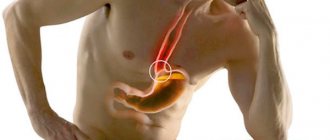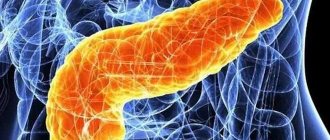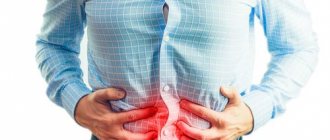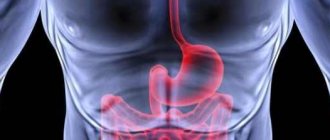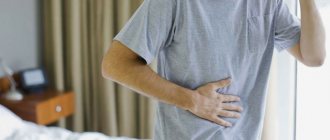Functions of mucus in the stomach
Since our birth, special cells have been producing mucus in the stomach.
The reason is that the substance is needed in this organ. Mucus, or mucin, is produced into bicarbonate. The resulting mucus-bicarbonate barrier protects the stomach tissue itself. This is the main function of the mucous membrane. Mucus protects our body not only from gastric juice, but also from what we eat. Poor nutrition, diets, as well as overeating are all harmful. In addition, the gastric tract is not designed for rough food and cigarette smoke. All these shocks gradually destroy the protective shell, and the body is forced to develop protective mechanisms.
Basic treatment methods
How to get rid of mucus in the stomach? All therapeutic measures that are prescribed to the patient can be divided into several main groups:
- Drug therapy.
- Correction of the patient’s diet, habits, as well as harmful factors that led to the development of the disease.
- Ethnoscience.
- Long-term prevention of new exacerbations of the disease.
Drug treatment for excess stomach mucus
Pharmacological treatment of excess mucus in the stomach is aimed at the factor that caused it. Therefore, in case of Helicobacter pylori infection, the patient is prescribed multicomponent eradication therapy (two antibiotics and antisecretory drug tablets).
In case of poisoning, it is recommended to use sorbents - medications that absorb toxins and particles of pathogenic microorganisms. If reactive inflammation is detected, then antacids are actively prescribed, which cover the gastric mucosa and promote its accelerated regeneration. In case of enzyme deficiency, their natural analogues are used.
ethnoscience
How to remove mucus from the stomach using folk remedies? For example, you can use cabbage juice. It stimulates the production of parietal cells and increases acidity in the stomach cavity. Coffee and green tea have the same ability, but they should not be brewed too strongly. Potato juice on an empty stomach also helps normalize the function of the glands.
Chamomile tea helps with inflammatory processes
or
St. John's wort
. You can drink it 3-4 times a day on an empty stomach.
In a hypoacid state, it makes sense to use citrus juice. There is also a method in which you need to grind horseradish and add it to lemon juice. This solution should be drunk a teaspoon after meals. A good result is obtained from tea made from pounded ginger, which must be prepared by adding a teaspoon of root to 500 ml of table water.
Why is excess mucin dangerous?
Insoluble mucus, also called “mucin,” is produced by accessory cells and surface epithelial cells. It envelops the gastric mucosa and protects it from the effects of hydrochloric acid, pepsins, and irritants that can come from food. Mucin consists of carbohydrates and amino acids.
- If there is a lot of mucus in the patient’s stomach, then its acidity decreases, and this is not very good, since the food entering it begins to ferment, becomes foamy, rots in the stomach and intestines, the patient suffers from flatulence and belching with an unpleasant odor.
- The patient loses his appetite and quickly loses weight, which affects the general condition of the body.
- Many nutrients are not absorbed and simply leave the body.
- Excess sputum leads to changes in the patient’s gastric mucosa; wounds can form on it, which over time turn into ulcers. This is also facilitated by the spread of pathogenic microorganisms, which increase in number due to decreased stomach acidity.
Many people mistakenly believe that excessive amounts of this substance are not harmful to health. Doctors say that a huge amount of mucus on the walls of the stomach activates pathogenic processes leading to the appearance of wounds on soft tissues.
If left untreated, they will increase in size and develop into peptic ulcers. Such neoplasms injure the epithelium of the organ and provoke various diseases, some of which are difficult to treat.
Long-term gastritis and mucosal hypertrophy can even cause stomach cancer. To prevent such negative consequences, at the first signs of illness you need to immediately visit a specialist.
When excess mucus is produced in the stomach, complex processes begin that lead to the formation of peptic ulcers. They penetrate quite deeply into the walls of the organ. This causes minor discomfort. In addition, pain, vomiting, and cramps in the abdominal area may appear.
Subsequently, hypertrophy of the mucous membrane occurs, gastritis with an increase or decrease in acidity, and ulcerative lesions may develop. If these diseases are not treated, stomach cancer may develop.
If there is a deficiency of mucus in the stomach, this also leads to negative consequences. In this case, mucin cannot protect the mucosa, and it is damaged by hydrochloric acid or food. Subsequently, the formation of stomach cancer may also occur.
To prevent negative consequences, at the first symptoms of discomfort, a person should undergo a detailed examination.
Possible complications
If the release of bile into the stomach and esophagus is regular, a disease such as gastroesophageal reflux disease develops. Its main cause is physical and chemical damage to the mucosa due to the aggressive effects of pancreatic juice and bile acids. Pathological changes lead to the appearance of the following signs:
- regurgitation, gag reflex;
- morning cough, often accompanied by bronchospasm;
- chest pain;
- belching, hiccups;
- bitterness in the mouth;
- feeling of a “lump” behind the sternum;
- snoring at night.
Bile reflux can especially often occur in a child after birth. In infants, the disease causes clear symptoms:
- repeated “fountain” vomiting;
- sometimes with bile or blood;
- weight loss;
- increased salivation;
- recurrent cough.
When a lot of bile in the stomach stagnates for a long time, erosions can form on the damaged mucosa and a peptic ulcer can develop. An additional provocateur of the disease can be infection with Helicobacter pylori against the background of reduced immunity.
If the reflux of bile into the stomach occurs regularly, the most common consequence is biliary reflux gastritis, which manifests itself:
- pain in the abdomen;
- feeling of heaviness in the liver area;
- stool disorder (alternating constipation and diarrhea).
With late diagnosis and lack of adequate treatment, bile acids and enzymes lead to specific changes in the gastrointestinal mucosa. As a result, cell malignancy is possible, which threatens the development of adenocarcinoma (one of the most malignant tumors).
Consequences
Any pathology in physiology has its consequences. If the volume of mucus increases, then:
- Acidity is noticeably reduced. Food in the stomach is poorly digested and begins to rot and ferment.
- Because food simply rots and passes undigested into the intestines, many nutrients are not absorbed.
- The body quickly depletes, a person loses weight for no reason.
- Bacteria develop in the stomach cavity and peptic ulcers begin to form, which cause pain.
It should be noted that the more mucus on the walls of the stomach, the less acidity, therefore, the worse food is digested.
Signs of the disease
The clinical picture of increased mucus production is manifested by the following clinical symptoms:
- a feeling of heaviness or obstruction in the epigastric region, which intensifies after eating;
- periodic stomach pain;
- nausea, repeated vomiting;
- decreased appetite;
- weight loss;
- increased gas formation in the intestines;
- tendency to diarrhea;
- belching (sometimes with an unpleasant odor);
- general weakness, decreased performance.
The severity of clinical symptoms depends on the cause of increased mucus production. However, the clinic mainly develops gradually.
Causes of pathology
Why does there become a lot of mucus in the stomach? This is usually how the body reacts to any damage to this organ. Therefore, most often this pathology accompanies many gastrointestinal diseases, namely gastritis, pancreatitis, esophagitis, cholecystitis and others. But these are not all the reasons; bad habits and dietary errors can negatively affect the functioning of the gastrointestinal tract:
- the patient smokes a lot and does not give up alcoholic drinks;
- he often drinks strong tea or coffee;
- the patient prefers fatty foods, eats a lot of processed foods, foods with flavorings, flavorings, dyes and other harmful substances;
- the patient constantly overeats or undereats, eats at different times;
- affect the functioning of the stomach and physical fatigue, stress, nervous tension.
Psychosomatic pathology
According to psychosomatic teaching, it is believed that the psychological problem of a patient who experiences regular bile reflux is prolonged fear. It is the constant fear and inability to share your problems with someone that provokes pathological processes in the digestive tract.
At the same time, a person lives in constant tension and horror, without an emotional outburst. This opinion is expressed by the famous psychologist Louise Hay.
Signs of excess mucus
What symptom might indicate that a person is producing too much mucus? A number of signs indicate this:
- the patient is bothered by belching with a rotten smell;
- the stomach is bloated;
- the patient is worried about nausea;
- in the upper abdomen, in the area of the stomach, intestines, the patient may experience aching pain;
- the patient has no appetite, over time he loses a lot of weight;
- there is often constipation;
- poor health also affects the patient’s psyche; mood swings and irritability may appear.
But it will be difficult to make a diagnosis based on one or another symptom, since they can accompany many stomach diseases. It is necessary to report these signs to the attending physician; he may refer the patient for gastroscopy.
We found out that there should not be a lot of mucus in the stomach, its layer should not exceed the specified intervals. It is bad when there is a lot of mucus in the stomach - the reasons and consequences are clear. Now let's look at how to detect these problems.
A person suffering from pathology will exhibit the following symptoms:
- aching pain in the stomach and sometimes in the intestines;
- sudden weight loss due to gradual atrophy of the glands that produce gastric juice;
- bloating and belching;
- constipation;
- on the mental side - sudden mood swings, irritability.
To understand the reasons for the appearance of the above symptoms, you need to be examined by a gastroenterologist.
Diagnosis and differentiation with other diseases
A gastroenterologist is involved in clarifying the diagnosis and identifying the cause of the reflux. During the examination, the doctor cannot do this, due to the fact that reflux does not cause specific symptoms. If there is bile in the stomach, the cause and treatment are interrelated. The accuracy of the diagnosis affects the choice of effective therapy and the speed of recovery.
Therefore, the main task of diagnosis is solved by prescribing hardware tests and consulting an endoscopist who will help differentiate the pathology from gastritis and ulcers.
Methods for accurate examination:
- FGDS (fibrogastroduodenoscopy) is an endoscopic method for studying the mucous membrane of the stomach and duodenum; it is used to detect swelling, hyperemia (redness), atrophic and modified areas, and erosions.
- Intragastric pH-metry, carried out around the clock - this method allows you to record changes in acidity, including regardless of food intake.
- Ultrasound of the internal organs of the abdominal cavity - using ultrasound waves, the presence of tumors in the liver and bile ducts can be excluded.
- Contrast radiography with barium - to assess the condition of the digestive organs and sphincter.
- Electrogastrography - to study the ability of the smooth muscles of the stomach to contract.
- Antroduodenal manometry is a study of the motility of the digestive tract with simultaneous measurement of pressure in the stomach and duodenum.
Based on the results of a comprehensive examination, the cause of bile reflux is identified. The doctor prescribes therapeutic procedures, medications, gives recommendations on nutrition and physical activity.
Mucus on an empty stomach
If a clear excess of mucin is visible during gastroscopy in the morning, after a prescribed long-term abstinence from food, it means that there are already some disorders in the body. It is advisable to check other organs - the pancreas, gallbladder and duodenum. Inflammation of these organs also increases mucin production.
What explains the appearance of mucus in the stomach on an empty stomach? The reasons for this may lie in the habit of smoking on an empty stomach. Smoking severely damages the mucous membranes of both the esophagus and stomach. The body somehow tries to cope with this and produces more mucins than necessary.
Why is this happening?
The concentration of mucus may vary depending on external or internal factors. The main reasons for the appearance of fluid in the stomach on an empty stomach include:
- violation of diet, abuse of fatty, fried, smoked foods;
- dry meals, snacks on the go;
- frequent overeating;
- alcohol abuse;
- smoking.
Frequent eating disorders can cause an extensive list of negative symptoms. Therefore, the main method of preventing this disease and many others is healthy nutrition at the same time. It is also recommended to eat small, fractional portions to avoid stress on the stomach.
Mucus and bile in the stomach. Gastroesophageal reflux
Why do bile and mucus accumulate in the stomach? The cause is usually gastroesophageal reflux. It happens that bile is detected in the stomach cavity during gastroscopy. Its one-time reflux from the duodenum into the stomach is not a dangerous problem. Reflux, that is, the reflux of bile, is diagnosed when the sphincter at the pylorus does not close well and constantly allows bile secreted by the liver into the stomach.
If, in addition, the mucin layer is greater than 1.5 mm, it becomes increasingly difficult for the stomach to digest food. Ulcers form quickly, since bile should not enter the pylorus of the stomach - this substance is destructive to the tissues of the organ.
Signs of bile reflux into the stomach are:
- heartburn;
- belching with a strong bitter taste;
- yellow coating on the tongue, early in the morning this very unpleasant coating and bilious taste are felt.
- bad breath.
In advanced cases, nausea after eating and vomiting with bile are often bothersome.
Main reasons
According to experts, the reflux of bile from the duodenum into the stomach periodically occurs in every tenth healthy person.
This happens at night and is not considered a pathological condition if the acidity of gastric juice is within normal limits. In this case, the pathology can be provoked by:
- eating in large quantities;
- the predominance of spicy, fatty, fried foods in the diet;
- intense physical activity;
- sudden movements;
- late dinner;
- eating stale food;
- drinking large amounts of drinks during meals;
- hangover after drinking alcohol;
- the fetus puts pressure on a woman’s internal organs during pregnancy;
- uncontrolled use of antispasmodics;
- stressful condition.
If bile appears in the stomach, the reasons may not only be physiological. It is likely that this condition is one of the symptoms of the following diseases:
- peptic ulcer of the stomach and duodenum;
- cholelithiasis;
- pathologies accompanied by cholestasis (stagnation of bile);
- duodenostasis – obstruction of the duodenum;
- gastritis;
- acute cholecystitis;
- malignant neoplasms;
- spastic condition of the gallbladder;
- biliary dyskinesia of the liver;
- duodenitis, accompanied by swelling of the mucous membrane of the duodenum;
- injuries in the epigastric region;
- insufficient production of protective mucus;
- impaired motility of the initial part of the small intestine.
In operated patients, duodenogastric bile reflux is often observed after removal of the gallbladder or suturing of a duodenal ulcer. In addition, if there is a lot of bile in the stomach, the cause of reflux may be:
- congenital defect of the biliary sphincter;
- smooth muscle dystrophy;
- surgical interventions during which the integrity of the pylorus (sphincter) was damaged.
For the proper course of the digestive process, a special secret is required, which is produced by liver cells and is called bile. This biological fluid has a sharp unpleasant odor, bitter taste, and tends to accumulate in the gallbladder.
When the initial section of the intestine is filled with food, which undergoes primary processing in the stomach, the active digestive phase begins. At this moment, the required amount of bile from the liver enters the duodenum to break down lipids, activate the contraction of the smooth muscles of the small intestine, eliminate the effect of pepsin, stimulate the production of mucus and hormones.
Normally, fatty food enters the stomach, its primary processing begins, and a food bolus is formed, which enters the duodenum. At this moment, the gallbladder contracts, and bile is released through the ducts into the intestinal lumen.
In this case, the bile should stop in the intestinal lumen and not enter the stomach or esophagus. Backflow of bile can be prevented using a valve device. But due to some disorders, an excess of cloudy, foamy bile enters the stomach, and sometimes into the lumen of the esophagus, reaching the oral cavity.
The root cause of reflux is a dysfunction of the sphincter, which is located on the border of the stomach and intestines. Additional provoking factors for reflux may be:
- insufficient contractility;
- increased pressure in the initial parts of the small intestine;
- irritation of the mucous membrane with aggressive duodenal contents.
Frequent reflux of bile secretions leads to the development of toxic-chemical gastritis. The fact is that bile and pancreatic enzymes destroy the protective layer of the mucous membrane.
Due to reflux and chemical reactions, the environment in the stomach becomes acidic. This leads to increased irritation and sensitivity of cells to gastric juice and bile. In addition, if bile contents are thrown back into the stomach, the pressure inside its cavity increases.
With insufficient contractility of the walls of the gastrointestinal tract, overflow of the stomach and duodenum occurs. Stagnation of food masses causes obstruction, as well as the return of excess into the stomach.
Diet
Some foods contribute to the secretion of mucus in the stomach, so their amount in the diet should be limited:
- give up dairy and fermented milk products;
- All flour products are contraindicated for the patient;
- the patient should not eat smoked meats, fried foods and anything fatty;
- Potatoes in any form are harmful;
- jelly and jelly;
- Alcohol is also contraindicated for the patient, as is coffee.
What is good to eat if you have increased mucus production? You need to cook porridge in water and eat it without oil (you can add a little olive oil): barley, rice, buckwheat, pearl barley, and so on.
Cook only crumbly porridges. With an increased amount of mucus, various vegetables (carrots, broccoli) are useful, as well as citrus fruits.
Dried fruits are also allowed. You can eat vegetable soup by adding onions and spices. Meat for the patient - in the form of meatballs or cutlets.
Treatment without changing dietary principles is practically useless when it comes to stomach problems. It is important to plan meals so that no more than 4 hours pass between them. Foods like hamburgers or French fries are absolutely useless, only harmful and contribute to obesity. Therefore, with the first signs of gastritis, you should give up the habit of eating street food.
Let's get back to the main thing. What should you remove from your diet?
- Milk porridge in the morning.
- Potatoes - no matter how cooked, any potato dishes contain a lot of starch and increase mucus.
- All flour dishes, especially baked goods.
- Alcohol and coffee. They strongly irritate the mucous membranes and cause a protective reaction in the body.
- Fried, smoked, fatty foods.
Useful products, that is, those that reduce the mucin layer, are:
- millet, barley and dietary buckwheat;
- vegetables - cauliflower, carrots, asparagus, beets, celery.
Vegetables contain fiber, so they are digested properly and quickly. In the diet, instead of animal fats, it is better to use raw vegetable fats - olive, flaxseed, sunflower oils. It is useful to introduce nuts and seeds into your daily diet.
Excess mucus in the stomach can be eliminated naturally, without drugs, if you start eating raw vegetables in the morning, get by with one piece of fish during the day, and eat boiled vegetable dishes in the evenings.
Features of nutrition and lifestyle
In the reflux treatment regimen, a strict diet and a healthy image are given special importance. Moreover, if traditional treatment is prescribed in courses, then advice on proper nutrition should be followed constantly. The patient must understand that smoking and alcohol have a detrimental effect on the functioning of the pancreas and the entire digestive tract. Therefore, bad habits should be abandoned forever.
Obesity is no less dangerous, so all patients need to be physically active and adhere to the following food intake rules:
- exclude fatty, spicy, smoked, salty foods;
- It is preferable to eat boiled, stewed, and steamed dishes;
- establish a drinking regime - drink at least two liters of water per day;
- products should be varied and prepared in crushed form;
- meals - fractional, regular: divided into 5-6 times a day with an interval of 2.5-3 hours;
- Do not bend or perform other physical exercises for an hour after eating.
| Allowed | Prohibited |
| Buckwheat, oatmeal, flakes | Fat meat |
| Butter and vegetable oil | Coffee, chocolate |
| Potatoes, zucchini, cauliflower, carrots | Margarine, lard, cream |
| Unsour apples, bananas, strawberries, black currants, blueberries | Radish, white cabbage, eggplant, sorrel, cucumbers, peas, beans, mushrooms, tomatoes |
| Eggs, dry biscuits | Grapes, pomegranate, sour apples, dates |
| Weak tea with a little sugar, mineral water | Cakes, pastries, jam |
| Lean meat and fish | Strong sweet tea, carbonated drinks |
| Dairy products | Juice from oranges, apples, peaches, grapefruit |
Mucus in the gastrointestinal tract in a child
A similar symptom occurs in both adults and children. In a child, it is provoked by taking certain medications, a psychological state, pathological digestive processes, infections and disorders of the central nervous system.
In rare cases, a mother whose child is under one year old should be concerned, since most often foamy vomiting is functional. It is worse if it is repeated, then such a symptom is caused by dysbacteriosis, requiring immediate treatment.
If there are worms, children may also suffer from this symptom. The child loses a lot of weight and his appetite increases. To diagnose this cause, you need to visit a pediatrician. The doctor will examine the child and write directions for tests. If the stool test for eggworm is negative, this may indicate that the child is malnourished.
Serious disturbances in the functioning of the child’s internal organs can also be detected as a symptom of foamy vomiting. In this case, when self-medicating, the risk of developing complications and allergic reactions is very high. Therefore, when this sign appears, you should always contact your pediatrician; the child may need inpatient therapy.
The viscous substance in the stomach, or mucin, negatively affects digestion, especially in childhood. Why does mucus accumulate in a child's stomach? The cause is excessive consumption of buns, sweets, street food, as well as the habit of eating fried and fatty foods at night. After all, at night the production of gastric juice stops; all food eaten late in the evening wanders into the gastrointestinal tract and is not digested. This applies to both children and adults.
However, this stomach condition is very dangerous for a child. It can quickly develop into other serious pathologies, and most importantly, it prevents the child’s body from developing. Due to problems with food digestion, many substances are poorly absorbed in the intestines, and it is extremely important for a growing body to receive as many vitamins and microelements as possible.
The role of mucus
Mucin is secreted by glandular cells, it is necessary for processing food (due to it, hydrochloric acid is also processed) and protecting the stomach. In a healthy person, the mucous membrane is about 1.5 mm thick; in appearance it resembles jelly and has a fairly viscous structure.
Depending on which cells produce the substance, the mucus may be cloudy, pink, or foamy (this type is the worst to dissolve). The main components of the substance are:
- plasma;
- various microorganisms;
- blood;
- electrolytes;
- polysaccharides.
Dysfunction of the glands leads to an inflammatory process, as a result of which the thickness of the membrane decreases and the walls of the organ become vulnerable.
With some abnormalities in the tissues of the stomach, on the contrary, too much mucus is produced, which leads to its accumulation in the stomach, intestines and esophagus.
Resulting in:
- it takes longer to process food, food may begin to stagnate in the stomach;
- due to fermentation and accumulation of gases, a person begins to suffer from bloating;
- pathogenic bacteria and microbes spread;
- nutrients and microelements are not absorbed by the walls of the stomach, but simply leave the body;
- if the accumulation of mucus is excessive, it will displace gastric juice and begin to clog the intestinal tract.
Experts say that the role of mucus for the entire body is very great, so if there is excessive or insufficient production of it, you should immediately consult a doctor.
Folk remedies
It is also possible to remove mucus using folk remedies, but recovery will take longer. Washing has proven to work best:
- Half an hour before eating, drink a liter of filtered water with added salt (a tablespoon) on an empty stomach. This liquid will change the structure of the mucin and promote its removal.
- If vomiting does not occur, you need to drink another 300 ml of liquid (it is safe for health).
- The procedure must be performed daily for 5-8 days, until mucus is no longer present in the vomit.
Doctors say that cleaning with salt water not only restores the stomach, but also fights inflammatory processes.
Other popular methods:
- Before meals, drink a glass of infusion of St. John's wort and dry chamomile. To prepare it, dry plants are mixed in equal proportions, and a tablespoon of herb is poured with 250 ml of boiling water. After 15 minutes, the infusion is ready for consumption.
- Ginger root. It must be grated and poured with a liter of boiling water. After an hour, the liquid is ready for use; you will need to drink it throughout the day. To improve the taste, you can add a small amount of fresh linden honey. Duration of treatment – 10 days.
- You can add fresh dandelion leaves to your food (especially to vegetable salads).
- 150 ml of fresh lemon juice is mixed with the same amount of grated horseradish. The components must be thoroughly mixed and the resulting mass consumed twice a day, a teaspoon. Treatment continues until clear improvements are noticeable.
- High-quality mineral water helps restore the walls of the stomach and eliminate excess mucin. You will need to drink it daily.
- You can remove mucus by drinking a small amount of fresh cabbage juice every day. The first dose should not exceed 50 ml, gradually the amount should be increased and brought to 100 ml.
The patient must take into account that some decoctions and products may be contraindicated due to individual characteristics, therefore, before starting treatment with folk remedies, it is recommended to consult a specialist.
This sign always indicates significant disturbances in the body. It is often observed with severe stomach or intestinal ulcers. Cancer of these organs is also partly the cause of hematemesis. The factor itself is determined not only by general characteristics, but also by the color of the vomit. With gastric, pharyngeal and vascular bleeding, the vomit will be bright red.
Brown masses are the result of bleeding in the lower parts of the stomach or duodenum. One of the signs of liver cirrhosis is bleeding of the esophageal veins. Foamy, bloody vomiting is also characterized by bleeding in the lungs. Such conditions require immediate emergency assistance.
The signs and timing of foamy vomiting may help identify the cause. In the morning hours it occurs during pregnancy, with alcoholic gastritis and very serious diseases of the brain and blood vessels. Nausea that occurs in the evening is a sign of gastric obstruction, most often occurring after eating.
It makes no sense to use only traditional methods, especially if excess mucus is a symptom of a disease. It is necessary to eliminate the cause of the appearance of mucin. But sometimes you can use traditional medicine, after consulting with your doctor.
Salt solution
The removal of mucus with a salt solution helps. This is a good way to remove excess mucus from the stomach, especially if the phlegm collects in a lump. It is better to carry out this cleansing procedure in the morning if you have not eaten anything for a long time. Take 1 liter of water and dissolve 1 tbsp in it. salt, with a slide. Drink this salt water within 5-10 minutes.
Healing herbs
Treatment with folk remedies also includes the use of various herbs. But before preparing decoctions, read all the contraindications, make sure that this or that herb will not harm you.
You can drink tea made from St. John's wort and chamomile flowers; it also helps clear the stomach of mucus. These herbs should be taken in equal proportions (1 tablespoon of the mixture) and poured with hot water (250 ml), left to infuse (20 minutes). It is recommended to drink this tea on an empty stomach. In summer, it is useful to eat fresh dandelion leaves by adding them to vegetable salads.
Ginger root is also considered healing. Buy a small root and grate it, pour 1 liter of boiling water over the resulting pulp, leave to steep (1 hour). You need to drink this infusion throughout the day. To improve the taste, you can add a little honey to the drink. You can be treated with ginger for a week or a little longer.
Other means
How else to remove excess mucus? You can buy high-quality mineral water and drink it every day. Another simple way to cure this pathology is to drink cabbage juice. The first time, drink only 50 ml of fresh juice, then - more, maximum - 100 ml. Other freshly squeezed juices, for example, from citrus fruits, are also useful.
After consulting with your doctor, you can prepare another folk remedy for mucus using horseradish and lemon juice. Buy 150 g of horseradish and 3 medium-sized lemons. Grate the horseradish and squeeze the juice out of the lemons. This medicine is taken morning and evening, 1 teaspoon.
Excessive mucus production, like any malfunction of the body, can seriously harm human health. It is important to consult a doctor as soon as the first symptoms appear. These signs may also indicate a serious gastrointestinal disease, so you need to undergo examination and begin a course of treatment as soon as possible.
How to remove mucus from the stomach with medications and folk remedies
Removing mucus from the stomach means preventing the development of acute pathologies of the digestive tract, which quickly become chronic.
Its accumulation is accompanied by the development of putrefactive and fermentative processes with the appearance of belching, nausea, and pain in the epigastric region.
Since the secretory substance is formed in the stomach for various reasons, the first thing you need to find out is the nature of the provoking factor. This will allow you to remove mucin as quickly as possible, preventing complications from occurring.
Why is mucus formed?
Mucin, which coats the stomach wall with a thin layer, is constantly produced by epithelial cells. In addition to water, its composition is represented by mucins - high molecular weight glycoproteins containing acidic polysaccharides. The secretory substance is evenly distributed along the inner wall of the stomach, performing the following functions:
- protecting the organ from the effects of negative factors - aggressive hydrochloric acid, pepsin, sharp food particles, hot seasonings, excess salt;
- strengthening local immunity;
- inhibiting the active growth and reproduction of pathogenic bacteria Helicobacter pylori, which triggers the development of gastritis.
So removing mucin is useful only when it accumulates excessively. In other cases, its removal will be the impetus for a decrease in the secretory functional activity of the gastrointestinal tract.
Causes of increased mucus in the stomach
A lot of mucus in the stomach is formed for both pathological and natural reasons. The latter, for example, includes excessive consumption of fatty, fried foods.
If a person is unable to refuse it, then a pathological cause soon appears - hyperacid or erosive gastritis. Therefore, to get rid of mucus in the stomach, you often do not need to take medications.
Simply adjusting your diet is enough.
Bad eating habits
Normally, the mucus produced by cells is thick, viscous, and transparent. But with an irrational, unbalanced diet, its color and consistency change. It becomes white or yellow, and foam appears in the stomach.
This is a consequence of frequent consumption of smoked meats, semi-finished products, sausages, and foods rich in salt and spices.
Parietal cells produce too much hydrochloric acid, which can be neutralized by large amounts of mucus.
Doctors have to remove excess mucus if a person swallows food without chewing it well, snacks dry, eats 1-2 times a day, or adheres to a strict diet.
Stress
A secretory substance begins to accumulate in the stomach under the influence of acute experiences. Its production is triggered during stress, when neurotransmitters - adrenaline, norepinephrine - are released into the systemic bloodstream.
Bioactive substances stimulate the activity of all vital systems. All organs work at full capacity, including the stomach.
So it is possible to remove excess mucus in such a situation only by taking sedatives.
Alcohol and smoking
A common cause of fluid in the stomach on an empty stomach is drinking alcohol of any strength. Ethanol irritates the gastric mucosa, forcing it to produce a lot of mucin for protection. This also happens when smoking on an empty stomach.
Nicotine and toxic tobacco tars provoke contraction of the stomach walls and increased synthesis of hydrochloric acid, even despite the absence of food.
It has to be removed by epithelial glandular cells, which begin to actively produce mucin.
Consequences
It is imperative to remove mucin and foamy liquid that accumulates in the stomach. Their stagnation leads to the development of not only inflammatory, but also destructive and degenerative processes.
The latter are often irreversible and affect all layers of the digestive organs, including the mucous membrane. Motor skills are upset, which further aggravates the situation .
If you do not remove the cloudy liquid from the stomach, then after several years and even months you will have to get rid of a chronic pathology that is difficult to treat.
Insufficient digestion of food
Often a secretory substance is formed in the esophagus, and not just in the stomach, which is manifested by painful attacks of nausea, the desire to constantly cough up, lack of appetite, and loss of body weight. Mucus partially inactivates hydrochloric acid and pancreatic enzymes, slowing down the breakdown of nutrients.
Nutrients are not absorbed
If mucin from the stomach even “gets” into the throat and nasopharynx, this indicates that undigested food is in the gastrointestinal tract for too long.
The nutrients, micro- and macroelements, and vitamins that come with them are only partially broken down by saliva. They are then metabolized and excreted without ever entering the bloodstream.
Due to a deficiency of bioactive substances, the condition of the skin, hair, and nails worsens, chronic diseases become worse, and intestinal and respiratory infections occur more often.
A lot of viscous liquid in the stomach leads to the death of beneficial bacteria in the intestines. As a result, the absorption of nutrients worsens even more. If the secretory substance is not removed, then there is a high probability of an increase in the population of opportunistic microorganisms in the stomach and intestines.
Ulcer formation
Ulcers are formed not only due to increased acidity of gastric contents. The alkaline environment of mucus also predisposes to their formation. Under the influence of a large amount of mucin, the mucous membranes begin to ulcerate. The damaged tissue is then repaired to form scars. Therefore, the secretion must be removed immediately, before irreversible degeneration of the mucous membrane occurs.
Treatment of mucus accumulation in the stomach
Abundant accumulation of mucus is detected using gastroscopy - an endoscopic examination of the stomach with its visual inspection.
A special instrument (gastroscope) is inserted through the mouth and esophagus into the lumen of the hollow organ, and the image from it is transmitted to the device monitor. Removing mucin is not enough - you need to eliminate the cause of its increased production.
An integrated approach to therapy is practiced using medications, diet, and the use of folk remedies (in adults).
Medicines
The foamy secretory substance in the stomach can be removed with drugs from various clinical and pharmacological groups. When choosing them, the doctor takes into account the type of disease, the severity of its course, and the severity of symptoms. Most often, the following remedies help remove copious mucus from the stomach:
- antacids Maalox, Phosphalugel, Rennie, Gaviscon, Gastal;
- hemostatic agents for ulcers - Vikasol, Dicynon;
- drugs that increase the acidity of gastric juice - Acidin-pepsin, Plantaglucid;
- proton pump blockers - Nolpaza, Ultop, Omez;
- gastric antispasmodics - Dicetel, Duspatalin, Mebeverine;
- digestive enzymes - Panzinorm, Festal, Mezim forte, Enzistal.
The use of medications allows not only to remove mucus, but also to get rid of accompanying symptoms - coughing, release of bile, which provokes bitterness in the mouth.
Folk remedies
It is permissible to remove gastric secretions using folk remedies at the final stages of treatment. It is strictly forbidden to remove mucus with soda. This popular method causes the rapid development of gastritis .
How to remove fluid from the stomach without harming your health:
- 5 tbsp. mix elecampane, string and calendula spoons, add a liter of boiling water, filter after two hours, consume 100 ml before meals;
- 2 tbsp. spoons of calamus and 3 tbsp. spoons of St. John's wort pour a liter of boiling water, filter after 3 hours and take 1/2 cup after meals;
- pour 2 tablespoons of marshmallow, birch buds, and knotweed into the jar. Pour a liter of vodka without dyes and flavors into this mixture, leave the container in a warm, dark place for a month. They do not filter, but pour out the required amount. The longer the herbs are in vodka, the more beneficial the tincture is. To remove mucus, take a teaspoon of the product 3 times a day.
Diet
Mucus can be removed if its formation is accompanied by the release of green sputum or if there are no symptoms. In the latter case, doctors prefer to remove the secretion through diet. Avoid drinking alcohol, coffee, and black tea. These drinks greatly irritate the mucous membranes and prevent their healing.
A complete revision of the diet, which should consist of pureed soups, lean meats and fish, and cereal porridges, will help to quickly and effectively remove mucus. You need to bake foods, steam them, but do not fry them. You should eat 5-6 times a day, but in small portions.
Prevention
It is better not to remove mucus from the stomach, but to prevent its formation. It is necessary to eat properly, rationally, and in a balanced manner. Since mucus in the stomach often forms due to stress, sedatives will help - Afobazol, Tenoten, Persen, Deprim.
There are also pathological reasons for increased secretion production. These include chronic diseases of the gastrointestinal tract. This is gastritis of any form, enterocolitis, colitis, ulcerative lesions of the digestive organs, inflammation of the pancreas, gastroduodenitis. You need to see a doctor to prescribe proper treatment. This will prevent excess mucus production in the stomach.
Source: https://otravilsya.com/ochishhenie/detoksikatsiya/sliz-v-zheludke/
Timely gastroscopy
Gastroscopy is prescribed for anyone who complains of stomach pain and difficulty digesting food. Before the procedure, you must abstain from food for 8 hours. If a person smokes, you will need to wait about 3 hours without cigarettes until gastroscopy.
Excess mucus is immediately noticeable on the device screen, and the doctor will tell you about the high risks of developing pathology. But when atrophic gastritis is already present, which is often detected against the background of excess mucus, it is very likely that the next stage will be tissue degeneration. The glandular cells of the epithelium are replaced by another, more dense and “hardy” tissue. And this is Barrett’s disease, which is recognized by doctors around the world as a harbinger of stomach cancer.
Hypertrophic or atrophic gastritis are very scary diagnoses. In this case, you need to stop smoking immediately and gradually accustom yourself to healthy foods. It is important to find out the reasons for the formation of mucus in the stomach and begin treatment.
Therapy methods
When bile contents are thrown into the stomach, treatment is complex and is most often carried out on an outpatient basis. Hospitalization may be required for diagnostic purposes or in severe cases.
Only the attending physician, who is aware of the causes of reflux and the mechanism of this process, knows how to remove bile from the stomach of a particular person. When choosing therapeutic methods, the need to normalize the function of the pylorus, the activity of the duodenum, neutralization of the acidic environment in the stomach, and the composition of bile should be taken into account.
Main methods of treatment:
- elimination of symptoms – provides relief from pain, reducing the acidity of gastric secretions;
- medications – normalizes gastrointestinal motility, reduces the secretion of pancreatic enzymes, thins and alkalizes bile, restores the tone of the bile ducts;
- lifestyle changes, diet therapy.
It is important to normalize your weight; as a result, pressure will no longer be exerted on the muscular ring of the esophagus and gradually the functioning of the sphincter will be completely restored. If this does not help, medications are prescribed.
If conservative therapeutic measures prescribed by a doctor do not bring positive results, or help for a short period of time, indications for surgery appear.
A radical method - fundoplication - will help strengthen the sphincter, increase its tone and ensure unidirectional movement of food and bile. The operation is performed on young patients, as well as in severe cases of gastroesophageal reflux disease and the inability to get rid of the disease with conservative treatment.
After preliminary preparation and repeated diagnostic examination by a doctor, surgical treatment will be carried out in two ways:
- The open method is Nissen fundoplication with access to the affected area through an incision on the anterior abdominal wall.
- Laparoscopy is a low-traumatic manipulation performed using an endoscope with its insertion through two micropunctures.
In the absence of contraindications, laparoscopic fundoplication is preferred. The use of a minimally invasive technique does not require a long rehabilitation period. The patient quickly recovers and returns to his normal life.
Physiological disorders are well treated with medication if the reflux of bile into the stomach from the gallbladder occurs rarely and for a short time. Symptomatic treatment is also used for chronic inflammatory processes.
List of drugs:
- Proton pump inhibitors - to normalize the environment in the stomach by reducing the secretion of hydrochloric acid: Omeprazole, Pantoprazole.
- Prokinetics - regulate the motor function of the digestive system, good contractility ensures normal circulation of bile: Motilium, Motilak.
- Antacids - neutralize the acidic environment in the stomach cavity: Almagel, Phosphalugel.
- Hepatoprotectors are medications for liquefying and improving the composition of bile: Ursofalk, Ursosan.
- Antispasmodic drugs - to relieve pain: No-Shpa (analogue - Drotaverine).
- Choleretic agents - enhance the formation of bile, remove it into the duodenum: Chofitol, Holosas.
As an auxiliary way to eliminate unpleasant manifestations from the reflux of bile into the stomach, you can use remedies prepared according to doctors’ prescriptions. When using some medicinal herbs and other natural ingredients, do not forget that they will be used as an addition to medications while following a special diet and only with the permission of the attending physician.
Effective recipes for treatment using traditional healer methods:
- A decoction of flax seeds will reduce the manifestation of unpleasant symptoms of dyspeptic disorder. To prepare, you will need 1 tablespoon of raw materials and 200 liters of water heated to a temperature of 60 degrees. Pour liquid over the seeds and cook for 15 minutes. Leave the broth to steep for two hours. Take 15 ml morning and evening.
- The herbal infusion will relieve pain when bile enters the stomach. Plantain, immortelle, thyme and St. John's wort are mixed dry in equal proportions. Pour two tablespoons of the mixture into a thermos and pour 1 liter of boiling water. Leave for 30 minutes and take 1 spoon on an empty stomach.
- For reflux, as well as gastritis, dysbacteriosis, herbal tea with honey using the following ingredients also helps well: yarrow, St. John's wort and chamomile. Brew a small handful of the dry mixture with boiling water (250 ml) and add 1 teaspoon of honey. The drink can be drunk in the morning and evening.
In addition to medicinal herbs, even baking soda is an inexpensive and effective way to quickly eliminate acidity in the stomach and get rid of heartburn. Everyone can take half a teaspoon with enough liquid.
Flax seed decoction
Soda solution
Treatment of pathology
If the ultrasound showed a critical accumulation of fluid in the body, it is necessary to begin immediate treatment of the deviation. Treatment measures should be aimed not only at relieving the symptoms of the disease, but also at eliminating the cause. Timely therapy minimizes the need for surgery. For treatment, an integrated approach is used, which includes taking medications, traditional medicine and surgery at the last stage of the disease.
Medicines
The treatment regimen for each patient is prescribed based on the results of ultrasound and laboratory tests. Conservative treatment involves the use of medications that normalize stomach function and mucus production. The most commonly prescribed drugs are:
Bellasthesin will help get rid of pathology caused by inflammation of the mucous membrane of the digestive organ.
- "Bellasthesin." Painkiller based on analgin. Used to treat excess fluid due to gastritis.
- "Maalox." An antacid medication that is used to restore the mucous membrane.
- "Festal". Accelerates metabolism and normalizes acidity levels in the body.
- Antibiotics. Eliminate bacteria that provoke inflammatory processes in the gastrointestinal tract.
It is prohibited to use medications if contraindications are found.
Traditional methods
In addition to taking medications, alternative medicine recipes are also used. The following methods have a good effect:
- Therapeutic fasting. Once a week you need to give up food and drink only water. To relieve hunger, you can add lemon juice to the liquid.
- Black peppercorns. In the evening you need to eat 1 tsp. before meals with water. You can't chew it.
- Ginger. Infuse the crushed rhizome in 2-2.5 liters of boiling water, mix with lemon and honey and drink on an empty stomach, immediately after sleep.
Return to contents
Diet food
The most important condition for successful treatment of ascites is proper nutrition. The diet is based on maintaining the balance of sodium in the body and enriching the body with proteins. The amount of salt consumed per day should be no more than 1 gram. In addition, you must avoid the following products:
- fresh baked goods;
- fat meat;
- sausage and smoked meats;
- milk;
- spicy broths and sauces;
- coffee and strong tea;
- alcohol.
It is better to cook food by steaming or in the oven, in its own juice. Instead of salt, you need to add fresh herbs. It is better not to eat raw vegetables. It is better to eat 5-6 times a day, in small portions. The amount of liquid consumed should not exceed 1 liter. In addition, it is necessary to ensure that the temperature of the food is not too low or high.
Possible operations
If the fluid is foamy, the walls are inflamed, and medications do not help, the patient undergoes surgery. Surgical treatment is used for 10% of patients. The operation involves peritoneovenous shunting - special tubes are installed in the veins, which create additional channels for removing fluid. However, this technique causes complications, so you should consult a doctor before performing it.
Prevention and prognosis
The outcome of ascites directly depends on the disease that provoked it. Therefore, with proper and timely treatment, the pathology can be eliminated without consequences. Without urgent medical intervention, the disease is fatal. However, it is better to prevent any disease than to treat it. In the case of ascites, you need to monitor your diet and adhere to the rules for using medications. In addition, it is important to consult a doctor promptly.
